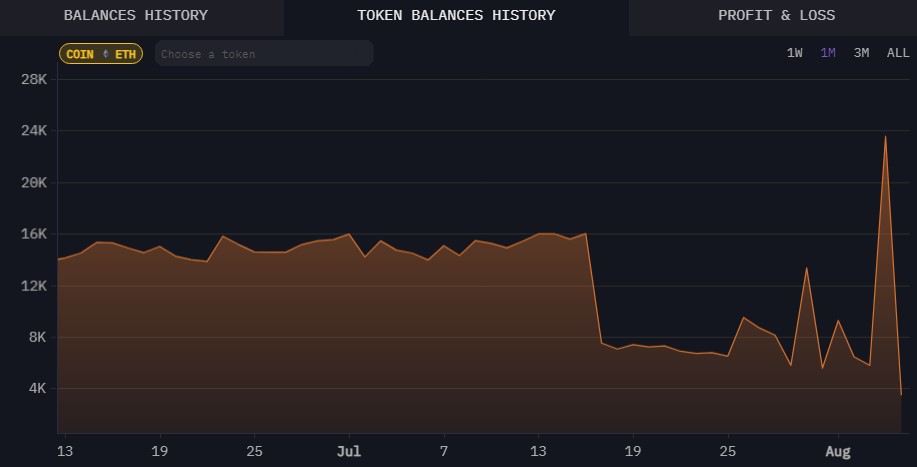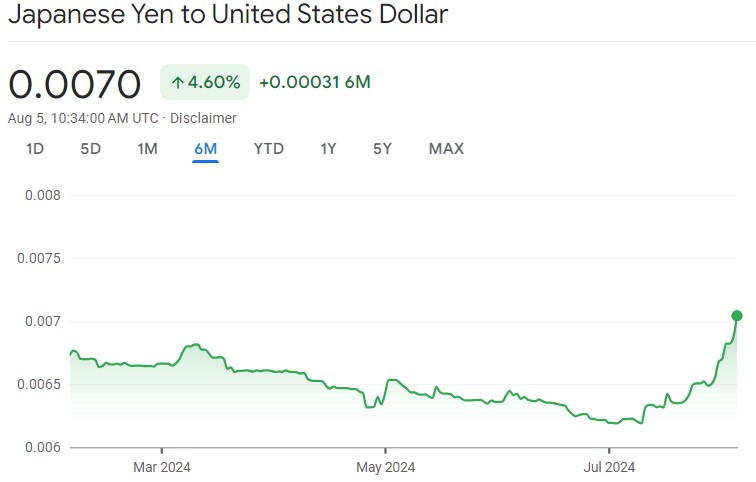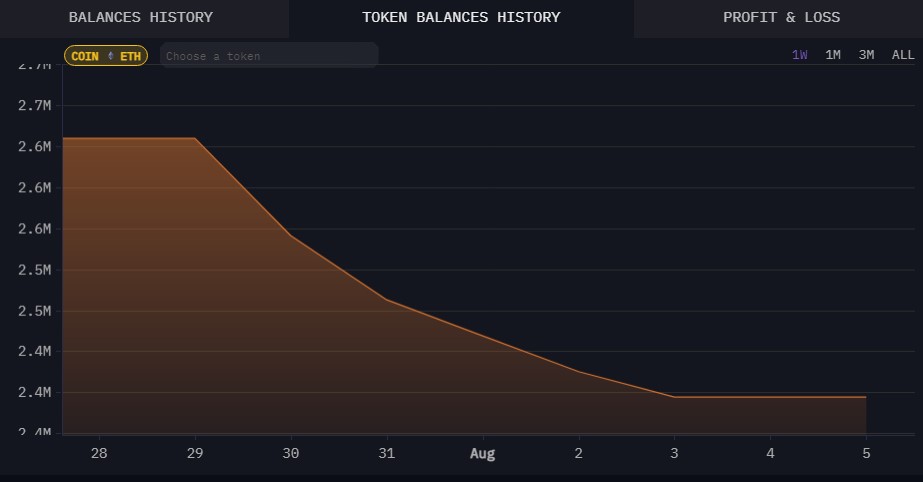Jump Trading’s recent transfer of hundreds of millions of dollars worth of Ether has stirred debates and market speculations.
This aggressive unloading of assets preceded a historic stock market crash in Japan on Aug. 5, where the Nikkei 225 index plummeted 12.4%, losing 4,451 points — its largest-ever drop in point terms.
Jump Trading moved around $315 million in staked Ether to cryptocurrency exchanges recently, with major transfers occurring over the weekend.
Rumors are rife that these trades might be part of a liquidation process as the proprietary trading firm prepares to wind down its crypto operations following its former CEO’s resignation amid a probe by the United States Commodity Futures Trading Commission.

Conversely, some analysts argue the firm may have anticipated a market downturn and moved swiftly to convert its risk assets into stablecoins.
The market crash in Japan followed the Bank of Japan’s decision to raise its benchmark interest rate for the second time since March and to the highest level in 15 years. This caused the yen to strengthen sharply after previously weakening to a 38-year low against the United States dollar in June.
“The most plausible reason, as I see it, is that Jump Trading has been borrowing yen to fund its high-frequency trading operations, perhaps to have enough liquidity at their disposal or to acquire crypto assets, in other words, as leveraged positions,” Mads Eberhardt, senior crypto analyst at Steno Research, told Cointelegraph.
“Now, as the yen has skyrocketed against the USD, making the loans measured in USD much more expensive to pay back, while their potential collateral may have taken a hit as well [and] Jump Trading may have been served margin calls for their loans.”
Jump Trading has yet to comment on the matter, and the firm did not respond to Cointelegraph’s media request.
Meanwhile, onchain data reveals that other companies, such as Grayscale, have also been offloading substantial Ether holdings recently, indicating that Ether dumps are not unique to Jump Trading.
Japan’s 21st century “Black Monday” and global recession fears
The Japanese stock market’s historic crash on Aug. 5 is fueling mounting fears of a global recession following the previous week’s disappointing US jobs data, analysts say.
This downturn, coupled with the Bank of Japan’s rate hike, has prompted fears that the end of the Japanese yen carry trade — a popular investment strategy due to Japan’s historically low interest rates — may be near.
A carry trade involves borrowing money from a country with low interest rates and converting it into another currency to invest in assets with higher returns.
“Most funds would borrow JPY, convert it to USD, and then use that to buy USD-denominated assets,” Justin d’Anethan — the head of APAC business development at market-maker Keyrock — told Cointelegraph.

The economic instability has led some experts to believe that firms involved in yen carry trades are now struggling.
According to Eberhardt, this could be why companies like Jump Trading are liquidating their assets.
“This may have led them to raise as much fiat as possible to pay back the loans. To do so, they must liquidate their most liquid bets, perhaps leading them to the fast liquidation of hundreds of millions worth of Ether,” he stated.
“I simply cannot find another explanation for why a respected trading firm, which should be well aware that crypto’s liquidity is extremely poor during the weekend, would still proceed to dump that much Ether in such a low liquidity environment.”
Jump Trading sell-off part of a trend?
An examination of its token balance history on Arkham Intelligence reveals that the company has been offloading its Ether holdings since July 20, and not over the weekend.
The company started by moving over 120,000 Wrapped Staked Ether (wstETH) from its Wormhole Counter-Exploit Funds address. Staked Ether in the wallet was reportedly recovered from the Wormhole bridge hack in February 2022, which suffered a $325 million loss.
The address’s activity shows that the majority of these funds have been withdrawn from the Ethereum staking protocol Lido. An associated address still holds around 37,600 of the wstETH, according to Arkham Intelligence data.
Jump Trading is not alone in this trend. Other major investment firms, such as Grayscale and Paradigm, have also been liquidating their Ether positions.
“This ETH obliteration is largely caused by capitulation from large funds,” commented DeFi Mochi on X.

Arkham Intelligence data shows that Grayscale has unloaded nearly 600,000 ETH since July 24, around the time of the Ether exchange-traded fund (ETF) launch date.
With this context, some view Jump Trading’s moves as part of a broader strategy to mitigate risks in anticipation of Japan’s Monday market crash.
“They might be just smart sellers,” Mikko Ohtamaa, co-founder of algorithmic trading firm Trading Strategy, told Cointelegraph.
Ohtamaa noted that the signs of Japan’s market instability had been apparent for weeks, giving macro traders ample time to prepare.
Jump Crypto could be winding down
According to the rumor mill, Jump Trading’s recent Ether sell-off may be a sign of the firm’s exit from the cryptocurrency market following reports last month that the US CFTC opened an investigation into the firm.
The theory states that “they wanted to exit their crypto business, which is insignificant compared to their main business in stock markets,” Ohtamaa said.
“It’s not worth the regulatory risk for them,” he continued.
Even before the probe, Jump Trading has faced numerous challenges in the crypto space.
The firm was embroiled in market troubles when its Solana bridge Wormhole venture was hacked for $325 million in February 2022.
Additionally, it was associated with the Terra collapse, where it allegedly engaged in key trading activities contributing to the crash, and the subsequent FTX crash, an exchange where the firm had heavy exposure.
These controversies have fueled speculation that Jump Trading is strategically retreating from the volatile and increasingly regulated cryptocurrency market.
All of the above
Two main theories have emerged regarding Jump Trading’s recent Ether sell-off. Some analysts argue that it is more likely a response to margin calls driven by Japan’s economic conditions, while others claim that it’s the beginning of the end of the firm’s crypto division.
But analysts argue that it doesn’t have to be one or the other.
“But it would make sense, based on Jump’s expertise in traditional space, they’re very aware of foreign exchange moves and might have to preemptively protect or correct carry trades with the JPY or just anticipated a market pullback,” Keyrock’s d’Anethan said.
“This might have worked out well, especially if they’re looking to reduce their crypto activity — just hitting two birds with one stone,” he added.
Eberhardt point to the flow data of US Bitcoin and Ether spot ETFs this week, which will reveal how traditional investors are responding to the tumbling market.
“If they show strong inflows this week, it may calm crypto market participants in general, while the opposite is true if the ETFs see outflows.”
The macroeconomic environment in the US is also under scrutiny amid fears of an impending recession.



